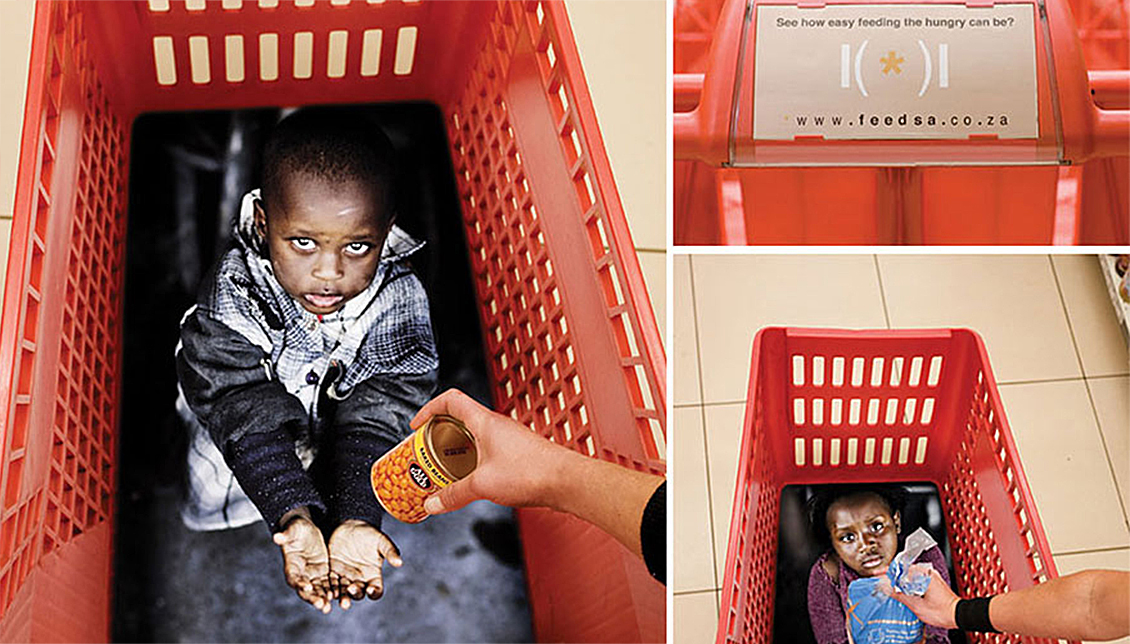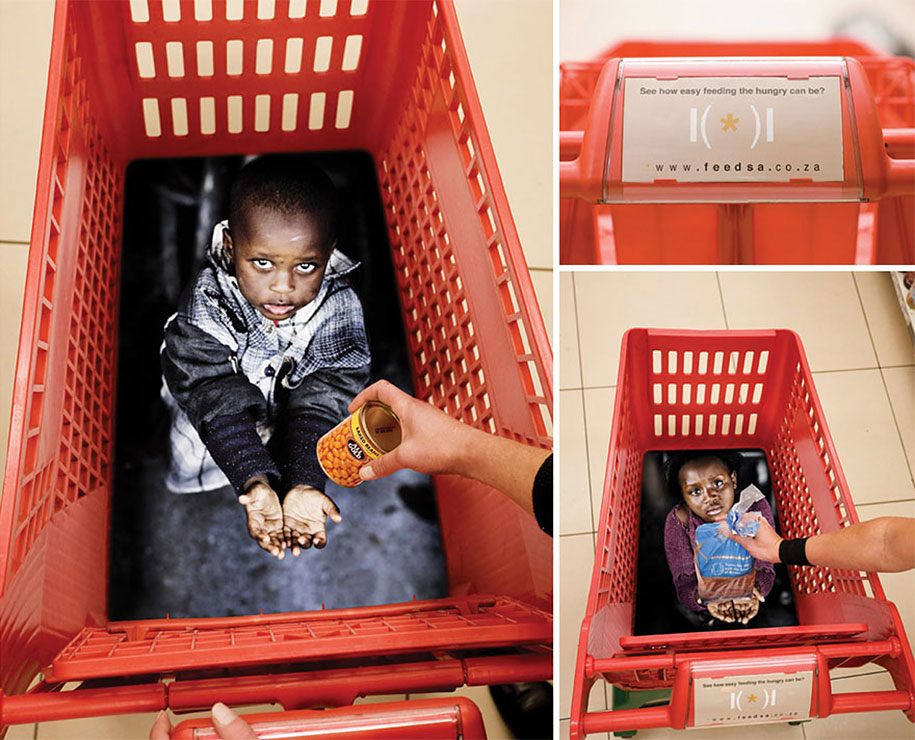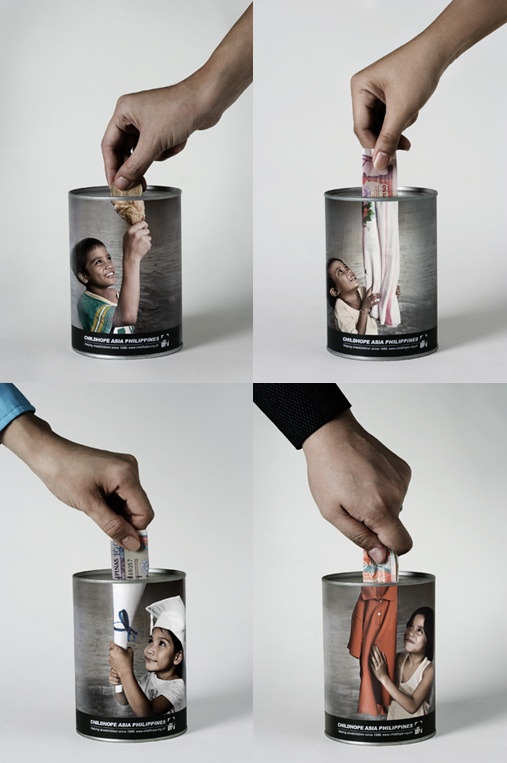
Once when I was on Pinterest looking for inspiration, I came across the photos below, they were part of the campaign "See how easy it is to feed the hungry?" from South Africa, 2008.
From a design point of view, I think this concept is really clever and powerful. By just adding a very simple touch to something all of us do almost every day – taking your grocery out from the shelf, and then putting them into your shopping basket, the images manage to turn one of our most mundane daily activities into a shocking revelation. Suddenly, the certainty of the wealth that surrounds our world seems to have subsided. Suddenly, we are stunned by both shame and guilt. These images are as poignant as someone had just come up and grabbed us by our shoulders, shaken us so violently that finally we woke up from our usual looking-but-not-seeing state. The message is clear – to encourage us to think of those less fortunate people in the world when we consume. However, there is also an undertone that sends a chill down my spine.
How small these people are being perceived; and how great we project ourselves to be.
Once when I was on Pinterest looking for inspiration, I came across the photos below, they were part of the campaign "See how easy it is to feed the hungry?" from South Africa, 2008.
From a design point of view, I think this concept is really clever and powerful. By just adding a very simple touch to something all of us do almost every day – taking your grocery out from the shelf, and then putting them into your shopping basket, the images manage to turn one of our most mundane daily activities into a shocking revelation. Suddenly, the certainty of the wealth that surrounds our world seems to have subsided. Suddenly, we are stunned by both shame and guilt. These images are as poignant as someone had just come up and grabbed us by our shoulders, shaken us so violently that finally we woke up from our usual looking-but-not-seeing state. The message is clear – to encourage us to think of those less fortunate people in the world when we consume. However, there is also an undertone that sends a chill down my spine.
How small these people are being perceived; and how great we project ourselves to be.
I cannot help but ask, "really?". Are we really this great that every penny, however small, that passes through our fingers could actually decide whether a person live or die, if he has cloths to wear or not, can he have access to clean water, or if he has the luck to go to school?
Honestly, this ad is so top-down that it is almost revolting.
Ever since I can remember, the images of hungry children in Africa have always been there. They were on the TV. They were in the newspaper. Every now and then, charities such as World Vision would send staff to our schools give speeches or to organise fundraising. I guess it would not be an exaggeration if I say my generation have grown up with these images, along with MTV pop singers and Japanese anime. Of course we tended to pay much less attention to these sad images then the other two things. I was a Girl Guide then. Every year my teacher would ask us to sell charitable coupons to raise fund for the needy. I found the task a great fun, like a game. Then I grew up and started to work. This time it is my turn to buy the same charitable coupons from colleagues who have daughters working as Girl Guides. In Hong Kong, Wednesday and Saturday are the designated Flag Day. It is a day when charities mobilise locals, mainly students and elderlies, to raise fund by selling a tiny piece of stickers (the flags) to passers-by. It is up to the buyers to decide how much they want to donate, usually no more then £1, sometimes up to £2. Once they pay their donations into the small plastic pockets the volunteers are carrying, they receive a little "flag" in return, which they will then stick onto their jackets for the day. It is a citywide charitable activity that has been going on for decades. In recent years I see the age of volunteers getting younger and younger. Some of them barely finish kindergarten, and usually accompanied by parents or Filipino maids. If it happens to be a hot day with strong sun, the maids will hold umbrellas for the kids when they are selling.
Hong Kong is certainly not the only place that organises regular fundraising. Any slightly wealthier country in the world is doing the same, and has been doing this for decades.
Nevertheless, the images of hungry African children are still there. They still do not have enough to eat. They still have very limited access to clean water. Their bright but pleading eyes stay the same. The role they play in this world stays the same. In fact, their image is way much more stable than the so called "One country, Two systems" policy in Hong Kong, a policy agreed between the British and the Chinese government to ensure freedom and prosperity in the city for at least 50 more years after the handover, a policy which is fast eroding in less then 20 years under the Chinese government.
I do not want to speculate if there is any "middleman fee" being deducted between the money we donate and the money they receive. Let us assume whatever we gave have indeed reached the pockets of the beneficiaries. But how come after over three decades, the situation stays exactly the same? Or, to put it more accurately, the reality that is projected by the charitable images stays virtually the same, why? Human is a progressive animal. We learn from our experience. And when the same action, even after it has been repeated thousands of times, still produces no result, should we start to ask ourselves if it is an effective way to solve the problem? Or worse, could it be just palliative? We are doing nothing more than spending a tiny bit of money (it must be very affordable to us) to make ourselves feel good?
For example, Hong Kong is a purely capitalistic, competition-oriented city. Capitalism blurs everything. It can easily blur the thin boundary between "do something good" genuinely and "do something good" for certain profits. The city's kids need to fight for a place in a good school as young as 1 year old. To ensure they impress during their interviews, they need a good portfolio. And schools, in order to attract bright (better if they could also be wealthy) kids and more generous government funding, they also need a beautiful portfolio. So suddenly a lot of young Hong Kong parents convert themselves to Catholics or Protestants so their kids can go to good Christian schools. As for the kids, not only they need to excel in all academic subjects, foreign languages and extra-curriculum activities, they also need to participate in charitable works. Charitable works grant you a certificate, you then add it to your portfolio. Charitable works also grant the participating schools certificates, which they can later upload onto their websites.
"It doesn't seem right, does it? To believe in god or to volunteer in charitable works with such motivation", out of curiosity, I asked one of my friends. "I agree the motive may not be the purest," she said, "but the truth is that I do believe sincerely in god now. So result-wise, isn't it still great?"
Well, I believe it is still great, especially if I was at the receiving end of such devotion (church and charities, for instance). However, at the back of my head, I have the image of that Filipino maid I spotted near my home, ordered to sell charitable flags on behalf of her employers – the mother and the kid were sitting and resting nearby.
Charity benefits our images. And of course such benefits are not only explored by Hong Kong schools and parents. Just think of all the ethical branding programmes, or restaurants guarantee they will donate if you dine with them, etc.
When your motives matter no more, how many people actually think of those they are supposed to be helping when they are cultivating their glamorous portfolios? enjoying a box of community-helping chocolate? or dining in a restaurant? May these people be hungry children, cancer patients, or persons with impaired vision…… do we actually care what these people think, that they, even being placed in the position of the needy, also have pride?
I suddenly remembered when I was still in the primary school, a charity came over to promote a campaign for helping the hungry. Children needed to find sponsors, upon completing a series of tasks, the sponsors would need to donate their promised amount and the successful child would receive a very lovely bread keychain as a souvenir. I still remember that mini keychain. The two ends of the bread were slightly pointed, the middle deliciously plumpy. The colour was also very well done. It was a rich brown, with slightly darker tone reaching the two sides, looking just like a loaf of freshly baked bread. They even put on a glossy, buttery varnish, making this tiny mini bread irresistibly cute. Back home, I beg my mother to let me join the campaign. What was in my head then was not the image slides the charity staff had shown us (I can not remember even one now), but that bread keychain she kept flashing in front of my classmates and I.
I would not say that charity is a lie. To say so I believe one needs strong evidence. I just find it hard to distinguish good will / feel-good effect / its positive impact on our own image. I also doubt its effectiveness. As I said, I have been seeing photos of hungry, dark-skinned children for over 30 years, and it looks like I am going to see the same photos for another 30 years, or even longer.
If nothing ever changes, then where the problem is?
At this point, I started to think of a movie I saw a long time ago. In the movie the virtuous Madame participated eagerly in charitable works and routinely distributed food to the most poor. However, in the end, it was not these small charitable acts that brought a real change to people's lives, but a feverish and destructive revolution. Revolution, even if it succeeds, tears down almost every aspect of our lives and it always costs so much to rebuild. Yet without pain there is no birth. To borrow a famous quote from the Latin American writer Eduardo Galeano:
I don't believe in charity. I believe in solidarity. Charity is so vertical. It goes from the top to the bottom. Solidarity is horizontal. It respects the other person. I have a lot to learn from other people.
Eduardo Galeano
Perhaps we are already too used to these images. Given the chance, who want to show himself or herself in such imagery? What kind of parents want their children (or themselves) to beg?
If the existing unfair global system does not change, no matter how much we throw into the donation box, these images will only persist.


